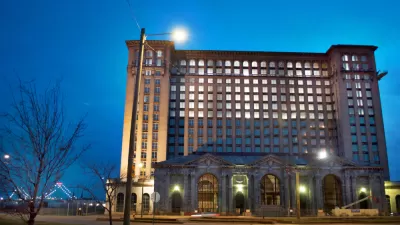In Detroit's downtown and midtown neighborhoods, 96 percent of rental apartments are occupied by young professionals, students and empty nesters. The city now faces the problem of meeting the high demand for urban living, reports Susan Stellin.
"The thriving apartment market in these neighborhoods is a bright spot in an otherwise grim financial picture for Detroit," says Stellin. "Once the nation's fourth-largest city, its population has dwindled and its finances are floundering." City officials have offered financial incentives for people to live and work in Detroit, young entrepreneurs and artists have contributed to the city's rebirth, and now the challenge is persuading "surburbanites to live closer to where they work and go out" and "figuring out how to reuse high-rise buildings and turn an area that once emptied out at night into a 24-hour community."
"A factor that has helped draw people to live in apartments either in midtown or downtown is up to $3,500 in rental rebates available to employees of companies like Quicken Loans and Blue Cross Blue Shield of Michigan," adds Stellin, "which have brought jobs back to Detroit." The city is also helping bring in amenities like bike paths, parks, and restaurants to attract prospective city dwellers. “This is truly a public-private sector driven strategy,” said George Jackson, president and chief executive of the Detroit Economic Growth Corporation. “What’s interesting is that the momentum and the partnerships are getting stronger even in light of the city’s financial situation.”
Developers could help meet expected housing demand by taking advantage of tax credits available for renovating historic buildings, but "a crucial factor is creating the thriving neighborhood hubs that places like San Francisco and New York have long offered." There is a 10-block gap between midtown and downtown "where the urban fabric drops off," said David Di Rita, a principal at the Roxbury Group. He acknowledged that the "area is gradually filling in," but pointed out that "much of the city was still struggling with empty buildings and abandoned single-family homes."
FULL STORY: New Thirst for Urban Living, and Few Detroit Rentals

Maui's Vacation Rental Debate Turns Ugly
Verbal attacks, misinformation campaigns and fistfights plague a high-stakes debate to convert thousands of vacation rentals into long-term housing.

Planetizen Federal Action Tracker
A weekly monitor of how Trump’s orders and actions are impacting planners and planning in America.

In Urban Planning, AI Prompting Could be the New Design Thinking
Creativity has long been key to great urban design. What if we see AI as our new creative partner?

King County Supportive Housing Program Offers Hope for Unhoused Residents
The county is taking a ‘Housing First’ approach that prioritizes getting people into housing, then offering wraparound supportive services.

Researchers Use AI to Get Clearer Picture of US Housing
Analysts are using artificial intelligence to supercharge their research by allowing them to comb through data faster. Though these AI tools can be error prone, they save time and housing researchers are optimistic about the future.

Making Shared Micromobility More Inclusive
Cities and shared mobility system operators can do more to include people with disabilities in planning and operations, per a new report.
Urban Design for Planners 1: Software Tools
This six-course series explores essential urban design concepts using open source software and equips planners with the tools they need to participate fully in the urban design process.
Planning for Universal Design
Learn the tools for implementing Universal Design in planning regulations.
planning NEXT
Appalachian Highlands Housing Partners
Mpact (founded as Rail~Volution)
City of Camden Redevelopment Agency
City of Astoria
City of Portland
City of Laramie




























